I’m so thankful that I can do my nomad thing in an era where now-indispensable travel resources like Google Maps, TripAdvisor, Wi-Fi and Airbnb exist. They make what I do entirely possible. With Airbnb, I can bounce around and set up a new home base in different countries with a few clicks of a button, and I don’t have to pay out the wazoo for a hotel room. Without a doubt, Airbnb has been one juicy, giant cherry on top of my sweet travels.
This post originally appeared on FY!S.
I’m about to share with you the things I’ve learned from using Airbnb to help you pick the right and best Airbnb for your needs, anywhere in the world. As a fair warning, most of this is geared toward dealing with long-term rentals on Airbnb, meaning you intend to stay for at least a month at a time.
But Hold on, Are You Familiar With Airbnb?
If you don’t know Airbnb, prepare to have your entire wanderlust mind blown to itty-bitty pieces of joy, my friend!
Airbnb is a site that lets you rent (as well as rent out) living space from locals of the destination you plan on visiting. So think unofficially and informally run hotel-type places. You can rent shared rooms, a room all to yourself or an entire apartment or home or cottage or cardboard box or practically any living space. Simply search by location and the dates you’re going to “check in” and “check out”.
The coolest part is that the Airbnb hosts, as the renters of these places are called, are often very welcoming and cordial. It’s like visiting a good friend who’s letting you stay in their home, except you have to give them money to be your friend (it’s less sad than it sounds).
Why Use Airbnb for Long-Term Stays?
Clearly, Airbnb is a great setup for a quickie or one week holiday, but what if you plan to stay for one or more months at a time? They’re perfect for long-term rentals, too!
Generally, when you’re in a country on a visitor’s visa, it’s next to impossible to convince any landlord to let you rent a place, let alone a room. Outside of Airbnb, your options are hotels and hostels.
Hotels can pretty much set your bank account on fire and dance around its ashes. Even if your cash flow is healthy enough to be OK despite that, I’m of the opinion that you don’t need to spend so frivolously. Hostels, on the other hand, are the complete opposite: They’re affordable, but you never really have any privacy. Or a feeling of home. Also, it’s a scary movie.
Airbnbs are just more cost-effective, plain and simple. My favourite part about it is that I get to meet cool local people who are a friendly, familiar face in an otherwise foreign country.
Treat a monthly Airbnb like you’re paying monthly rent for an apartment back home. The cool part is that it’s already fully furnished with everything you would need, if you know what you’re looking for. The utilities, including internet, are typically part of your fees so you generally don’t have to worry about that either. Not to mention, there’s no rental agreement.
Those are the good, of course. Then there’s the bad, such as the place being in a bad neighbourhood, pictures not being accurate, fake reviews and so on. I’ll cover all of these in the tips below to ensure you get the best experience you can.
1. Make Sure Your Profile Is Complete

Let’s first talk about your Airbnb profile. Do you have a photo? Does it look friendly? Do you have good reviews left by other hosts? Are you brand new? Can you prove you’re not a robot? Believe it or not, the completeness of your profile, along with how you interact with your potential host, can really impact the success rate of your booking.
In the world of Airbnb, you must first submit a request to book someone’s place. This is basically a place holder where your credit card isn’t immediately charged nor is your reservation of the place guaranteed, until the host of the place also accepts. Some hosts offer an Instant Book, denoted by a lightning bolt symbol, which is quick and painless.
There will be times when the host will shove your money back in your face. It’s not that they don’t want your money per se; they have bigger things to worry about: They’re probably just as nervous about letting you into their home as you are about going in to a stranger’s home. So yeah, they’re not going to let the person behind some new, faceless Airbnb profile waltz in.
If you’re brand new to Airbnb, add a nice, cheese-y picture. Share a little bit about yourself so that when a potential host looks at your profile they’re not going to think you’re some psychopath. (Everyone thinks the other person is potentially a psychopath of some sort.)
Basically, you want to give your host enough things to go on to convince them you are non-threatening and not going to wreck their house.
Checklist:
- Did you add a profile picture and a little blurb about yourself?
- If your account is new, be ready to provide extra info for your host. Most are generally receptive, but if you get a lot of booking rejections, it’s likely because of your profile.
2. Research, Research, Research. Seriously.
Research the different neighbourhoods of the city beforehand. Go on sites like TripAdvisor and enter the name of the neighbourhood to see what people have said about it. Use Google Street View (if possible) to get a feel of the area.
In addition, look at places and be ready to comb through the reviews of your host. If your host has several listings, read those reviews too. Read them all, and if there are a lot of them, read the three star or below reviews to see what the common complaints were. You have the right to be suspicious if the reviews are all five stars, but barely say anything. They could be fake.
Airbnb is awesome, but because it’s run almost entirely by average folks (guests and hosts alike) Airbnb has its hands tied when resolving issues and disputes, like refunds and cancellations. I cannot stress enough that researching, having questions prepared and being smart before you book are very, very important. Just take a look at stories from Airbnbhell to scare yourself into being extra cautious.
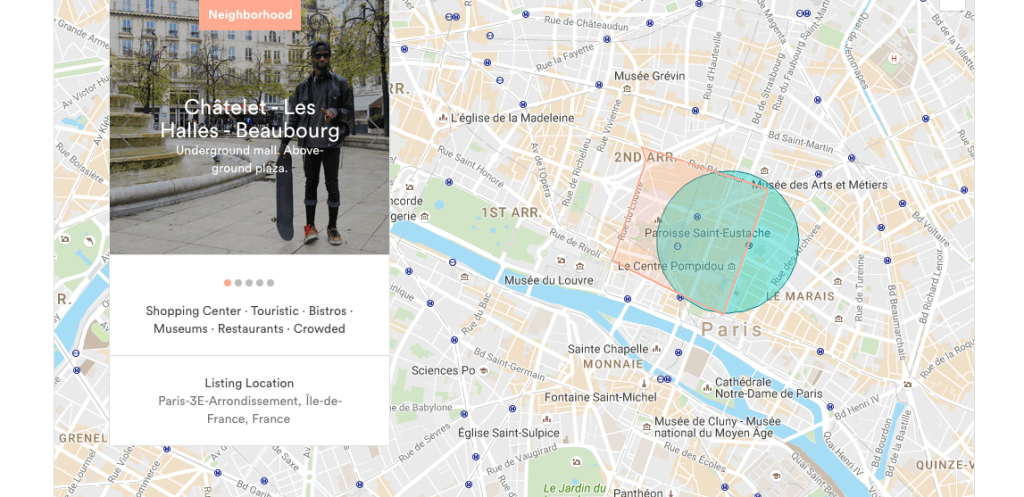
Airbnb listings don’t reveal the address until you book for safety reasons, but they will highlight the general area where the place is located.
I learned this the hard way recently in Paris, too. I had relied too much on looking at star ratings and reviews because I was in a hurry and neglected to look into the actual neighbourhood. It wasn’t until I got there that I’d realised I wound up in an extremely shady neighbourhood that I didn’t feel comfortable walking around in. Like, imagine the dodgy-arse outskirts of town, tagged in graffiti, trash strewn about in the streets, lots of shady characters gathered in groups, multiple signs to watch out for pick pockets and so on kind of shady.
I’d made a big mistake, considering I was in a foreign country, could not speak French and now felt stressed going to and from the Airbnb. I got this whole thing only somewhat resolved by talking to Airbnb and the host, but note that in these kinds of circumstances Airbnb is going to stress that it’s mainly on you to ask questions and know what you’re getting into with the listing, including surrounding area. Airbnb can’t do diddley-squat unless the issue is directly involved with the listing itself.
So yeah, research.
Checklist:
- Did you go on sites like TripAdvisor to research an area or neighbourhood?
- Did you read through the reviews?
- What about the reviews of the host’s other listings?
- If there are fewer than five reviews, proceed with caution.
3. Check Your Weekly/Monthly Rates
Many hosts are willing to provide weekly or monthly discounts. That means if you book at least a week or a month in advance you get a certain percentage knocked off the subtotal. This subtotal does not count the service fee which is typically non-negotiable. The offered discount is usually listed right there under Prices:

You’ll be able to see the individual host’s discount by setting your “Check in” and “Check out” date to include at least seven nights for a weekly discount and 28 nights for the monthly discount.

Example of a monthly discount, visible after you set the number of nights.
I’ve seen the weekly/monthly discount range between three per cent to 50 per cent. It all depends on a couple of factors:
- Location: Obviously, I’m talking about the country or city itself, but price also depends on the area. If it’s known to be very touristy or in a good area, you can expect the prices to be higher than less popular areas, so hosts may be less inclined to take on long-term guests.
- Season: Airbnb hosts tend to set their prices to go with the seasons. Expect prices to be higher or discounts to be lower (or both) during a tourist “hot” season. If they’re getting a lot of bookings, many hosts will experiment with setting prices a bit higher; and like hotels, the rates you see can change depending on which days you check in and out.
- Popularity of the host: The more popular the host, the less likely they will offer a decent discount.
- The host: Some hosts simply don’t do it or don’t know about it. It doesn’t hurt to ask though.
If you think you’re working with higher than normal prices or even if the discounts say zero, it’s always worth sending a message to the host and asking. We’ll go over this in the negotiating section below.
Checklist
- Did you set the Check In and Check Out dates to be seven nights to check a weekly discount?
- Did you set the Check In and Check Out dates to be 28 nights to check a monthly discount?
- Did you reach out to your host to ask about weekly/monthly discount rates if none are present on the page?
4. Compare the Host’s Provisions With What You Need
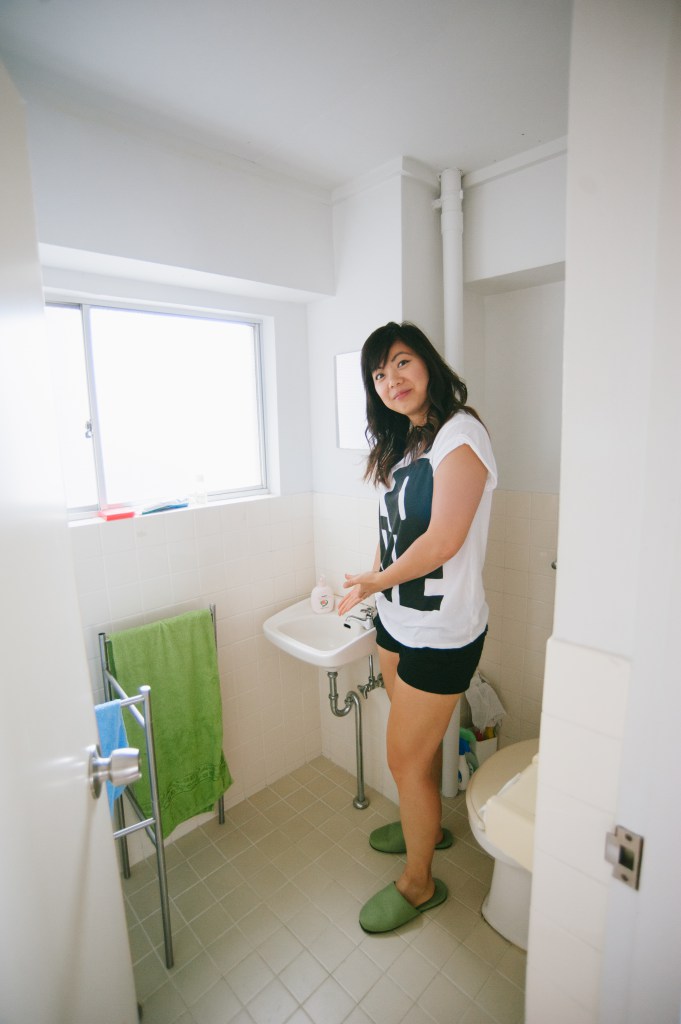
What ends up happening a lot of the time is that people get overwhelmed: Is this place cool enough? Is it convenient? Will I have access to great food and restaurants? Is it hip? Is it the place to be?
I understand all of those feelings and the allure of “shiny things”, but the problem is less “Is the place awesome?” and more “Is the place awesome for me?”
To find that out, you need to know what actually defines “awesome” for you. Take a moment to write down your greatest needs. If you’re going to live somewhere for a while, what amenities and things do you need from a living place (or nearby) to help you make this temporary home feel more like home-home? Do you mind sharing an apartment (a private room) or want privacy (a whole apartment)? Are you a smoker? Do you need to be able to bring guests over? Do you need to feel safe?
Note these down and compare these crucial needs with the host’s description and listed amenities. Read through it carefully so you don’t end up asking redundant questions. Experienced hosts tend to hate these and consider these as red flags (inattention to detail) to decline your reservation.
Let’s take my own needs, for example. My work lives entirely online, so the number one thing I need is reliable and unlimited Wi-Fi at home. Second, obviously because I spend so much time on the computer, a comfortable work station would also be ideal. (I’ve tried sitting on the floor with my laptop propped up on a cardboard box before and that was cramp city.)
Afterwards, my order of importance: Full access to the kitchen with cooking equipment, fridge, utensils and so on and laundry. Bonus points for a coffee maker. Then I’d like relative proximity to a grocery store and transportation. Extra brownie points for a nearby gym or park, but they’re not absolutely necessary if I can take the public transportation.
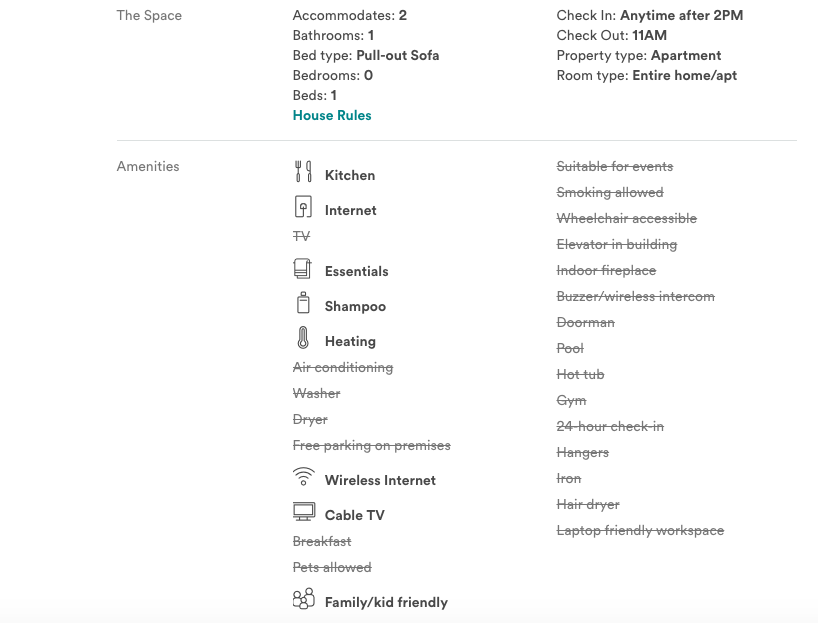
So any place that is in a good and safe neighbourhood, has plenty of positive reviews, has Wi-Fi, a good working space and kitchen are good enough for me to reach out to the host. When choosing the area, I prefer to avoid tourist neighbourhoods, but I also need to make sure it’s safe for me to walk around either during the day and at night.
Checklist:
- Did you make a list of your most important needs? Wi-Fi, a laptop working space, a hair dryer, a washer, a kitchen and so on? Can’t always have everything, but list your top five.
- Did you carefully read the description and what the host provides?
- Don’t think too much about things you can’t predict before seeing the place.
5. Always Have Questions
The descriptions and provided amenities all sound Little House on the Prairie perfect, but there are always more questions to ask.
Here’s the thing: It’s important to get a feel of how the Airbnb host treats his or her room, apartment or home. Is it some quick side cash, a legit business or somewhere in-between? This detail is important because if a host is really serious about Airbnb they would not risk you writing anything less than a four star review (as that could hurt their rating and visibility on search).
More importantly, however, this helps lend some credence to the accuracy of the photos, the veracity of the reviews and the neighbourhood in which the place is located. For example, some Airbnb hosts may add a bunch of pictures of nearby restaurants and cool touristy pictures to draw you in; or they get several angles of the same small room to obfuscate the “imperfections” or that it might be tiny as hell. Here’s an example of keeping an eye out for different angles of the same room:
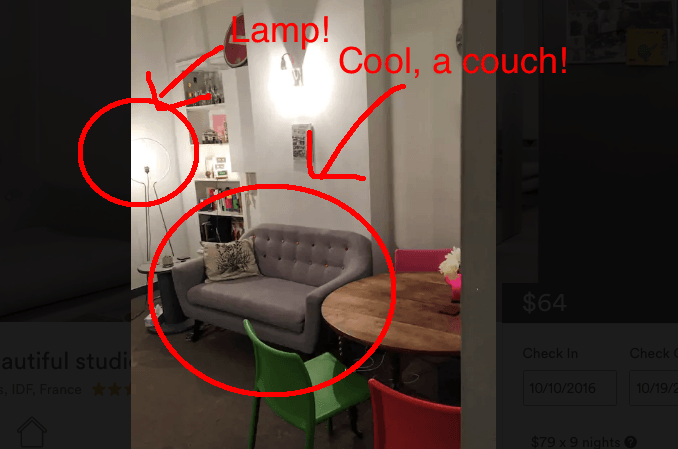
Not to pick on this listing in particular, but you can see that the couch and lamp make another appearance!
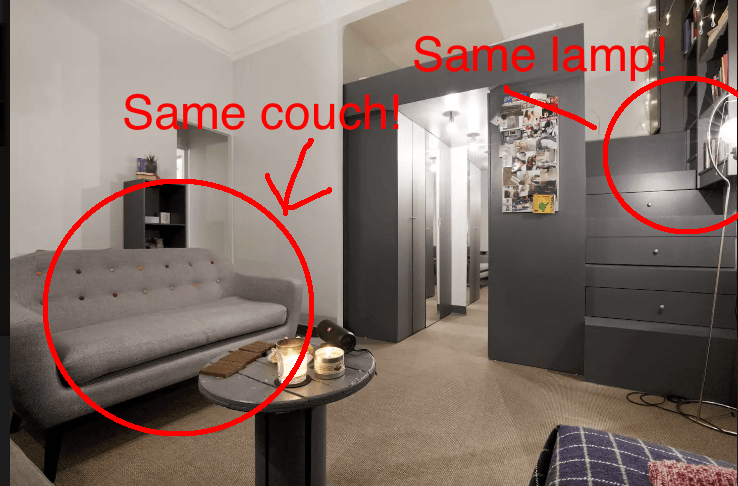
Just keep this in mind when you’re sizing up the place. If you ever need clarification on the size and how many people a place/room can comfortably fit, ask the host. Ask more clear questions, like “Would the room/space be big enough to let me do yoga/somersault/River dance every morning?” or something like that.
Since you can’t actually see the place before you arrive, it’s extra important that you examine the photos and think of questions to ask the host (that haven’t already been covered in their listing). Ask about whether it’s safe to walk around at night, for example. Remember to be respectful, as hosts are real people, too.
Checklist:
- Did you closely read the reviews and examine the pictures?
- Did you keep in mind that sometimes hosts can be dishonest with pictures?
- Did you ask very specific, clarifying questions?
6. Negotiating With the Host
A huge number of successful hosts treat their Airbnb as a legitimate business, but most aren’t exactly ninja masters in hospitality or business. They’re just your everyday homeowners or apartment renters so they may be open to negotiations.
This Lifehacker article explains a few of the finer points of negotiation. As influential money blogger JD Roth wrote, you need three things to have a successful negotiation: power, time and information. Since we’re dealing over the internet, time is a non-issue, but these two still apply:
- Power stems from having a good hand of cards: You have the right attitude, empathy (understanding of what your host needs/wants and his or her concerns), persistence and legitimacy.
- Information is just as valuable. “The more you know, the better your position,” Roth writes, and I couldn’t agree more. Gather information from reading reviews; a little about the area, location and culture; and the host’s description. It’s also knowing about what you can concede if the host pushes back. We’ll get to all of this shortly.
Altogether these are your leverage, and as the guest, you automatically have more power. On Airbnb, hosts generally want their space occupied by hassle-free and courteous guests. Of course, every host wants that. Hosts also tend to want financial security from an occupied room. Your main leverage is offering a huge sum all in one go and the promise that you’ll behave.
Once you’ve determined that the area, place and host all fit your needs, reach out through Contact Host (not through a booking) with the four W’s, in this order:
- Who? State who you are and what you’re doing (business or long-term travel) for whatever brief reason. If you’re a writer like I am, for example, offer a quick link to your blog/writing/portfolio.
- When? Tell the host how long you need to stay. (They already have an idea of when you’ll arrive based on your Check In date.)
- What? Based on what you’ve read of the host’s reviews and such, pick a point that you liked about the place and express your interest.
- Why? Here’s where you say why you’re interested in the place. For example, I like bright rooms with lots of natural lighting and a desk. If I see that in the picture, I’ll say so and add “…because I write and work better in such an environment.” The because is important.
All of this helps firmly establish your legitimacy, builds trust, encourages empathy because you’re a real person and also makes the host feel good because you’ve complimented their place.
Make the Ask
Before you make an offer, be sure to calculate the total from point number three and check the average rates from several similar Airbnbs in the area. You’re gathering information about the average Airbnb monthly rental market so you can make appropriate rebuttals or accept a fair offer. Note the lowest price for a place that’s similar and keep that in your back pocket. Here are a other few things to keep in mind:
- Mention you’re shopping around and found a couple of nice places, but you really like this place so you thought you’d reach out first to see what they can do.
- Don’t be so frugal that you try to squeeze everything, especially if you’ll be living with the host. Otherwise it will just make things really awkward.
If you’re not happy with the price or the Airbnb host isn’t playing ball, you can choose to move on or persist. As your final play, link to another Airbnb that’s lower in price and mention that you appreciate that they have entertained your offer and questions, but your budget allows you to go with the <link to the other Airbnb>.
About 30 per cent of the time, they may respond with a lower offer. Or you can make concessions: See if they can provide you with various amenities throughout your stay (soap, shampoo, toothbrush, towels, coffee and so on); or lower the cleaning fee (if it’s ridiculous).
Your success rate obviously will vary from host to host. Some don’t need your “business”, especially if they’re active and have a high booking rate. Here’s me doing negotiations very early on.
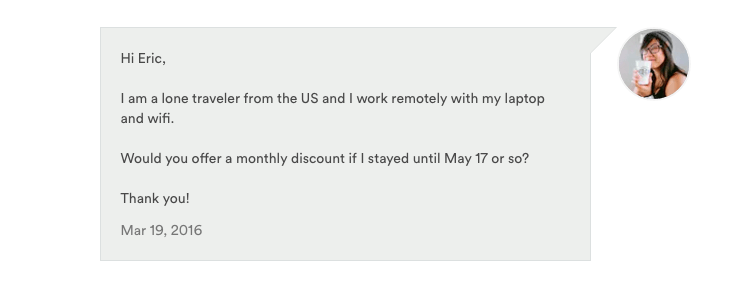
He responded by saying he could give me a monthly discount of 10 per cent.

This was a bit more aggressive of me. Expect hosts to baulk at negotiation attempts or ignore you, but that’s the nature of negotiating. Luckily, in this example, my host responded saying he can do his best and gave me a rate that was reasonable enough, which I accepted.
Having talked to a lot of hosts myself, I know that the more experienced hosts tend to frown upon this because they think guests that negotiate tend to be more trouble than they’re worth. The thing is, too, most hosts know that they can make a lot more money by taking in many new Airbnb customers over a month rather than accepting just one who’s going to hog up the whole calendar.
While I can definitely see their point of view, us long-term guests have a bit more leverage: Length of stay and guaranteed booking. Those are especially powerful, especially if the tourist season has dipped. We can sweeten the deal by ensuring the host we’re not trying to nickel and dime them and remaining cordial and understanding. Here’s a script you can try using:
Hi <host name>,
I’m Stephanie from California. I’m a travelling writer who writes on my own blog FY!S and on Lifehacker.com (here’s an example of an article about health!), and am visiting <whatever city> to do more writing and hope to live like a local at the same time.
I plan to stay for X number of nights and found that people have a lot of nice things to say about your home. I especially love the look of the room. The desk by the window is perfect because I can concentrate and write.
With my length of stay, would you offer a special [or “better” if they already listed a discount rate] weekly/monthly [choose one] rate? In my experience, some of the hosts have kindly accommodated [we’re establishing a precedent]. I don’t mean to be any trouble, but I’ve never been to <city> [say this only if true] and am shopping around to make sure I find a quiet, suitable place for myself long-term.
Let me know, and thank you for your consideration!
Keep the message as short as possible and to the point. Don’t need epic yarns here. And as they say, don’t put all of your eggs in one Airbnb. Send messages to a couple of hosts and compare.
Checklist:
- Did you research the area to see what the general going rate was?
- Did you make sure you were cordial when you negotiated? Don’t try to nickel and dime everything. It will make things awkward.
- Did you message a couple of hosts? It’s rare to have your number one choice always be OK.
7. Should You Go With “Superhosts”?
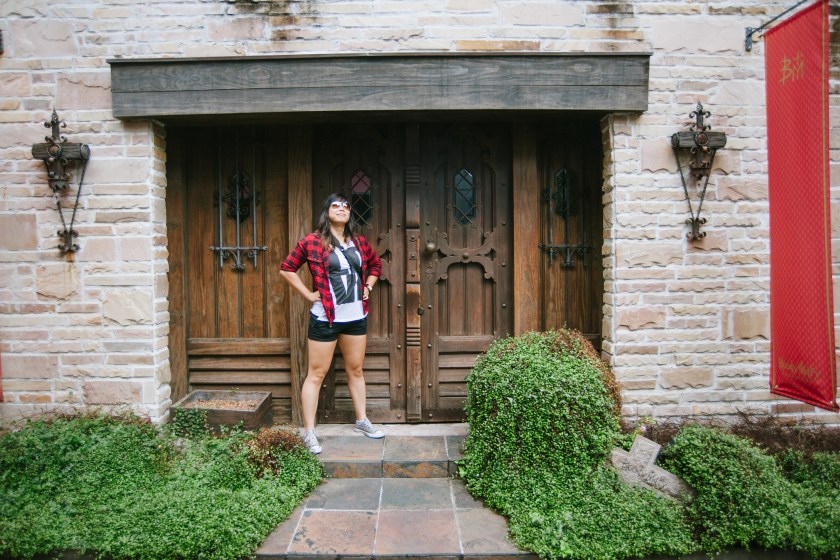
Superhosts are denoted by a special badge. They have earned this special status because they have had stellar reviews and satisfied a few other prerequisites listed on Airbnb’s site here. Basically, these hosts are well-liked and fairly experienced. Airbnb re-assesses host performance every so often to see if someone becomes a Superhost or loses the status. Think of Superhosts as, like, the “employees” who go above and beyond on a regular basis.
The bad: Superhosts probably have a really high customer churn rate. It’s more likely that Superhosts won’t be down with long-term stays. As always, it doesn’t hurt to ask.
The good: It makes sense to go with a Superhost in most cases, especially in an unfamiliar area. You can count on them to not be scams and answer your questions in a timely manner. You can also use their listings as reference and research to learn about the area or for when you talk to other hosts.
One thing to play to your advantage is knowing that maintaining Superhost status can be very demanding and draining. Your possible leverage would be to let the Superhost know that you are easy-going (assuming that you truly are), can guarantee a booking for a period of time and can let the Superhost sit back and relax a little bit.
Checklist:
- Not all Superhosts will be fine with long-term stays, but it’s worth asking!
8. Avoid Transactions Outside of Airbnb… Most of the Time
There are scams that when you try to book something they may initially reject your credit card payment over Airbnb and message you with some nonsense reason. Then they drop an external link and ask you to pay there. This should immediately feel fishy to you. Don’t click on the link!
Airbnb policy can (but not always) protect the guest and host, so if possible, conduct everything on Airbnb itself. That way, you can easily rope Airbnb to dispute things, but also have a proper case for your credit card company should anything happen.
On the other hand, if you have gotten to know the host for a while and you both agree to it, it’s possible to get around the Airbnb service fee and other fees by dealing directly with the host, using Paypal or some similar payment service. Of course, this is at your own risk, but it’s something I’ve done a few times to extend my stay without paying extra for fees.
9. Above All, Don’t Be An Arsehole
Even though you’re renting someone’s place, you’re a guest in a good friend’s house. Make yourself at home, but treat things with respect.
Let your host know all of the things you need up-front and they will let you know if they already have it or can somehow provide it, within reason. This is more of just a courtesy so you don’t spring surprises on the host and make unfair demands. Yes, you’re paying for your room and board, but again, these hosts are not a multi-million dollar corporation that needs to bend to your every whim.
Leave a gracious review for your host whenever you can so that everyone wins. Hope this all has helped.
A Super Guide to Finding the Best Airbnb and Living Anywhere for Months at a Time [FY!S]
Images by Karen Hong Photography, Stephanie Lee, and Andy Orin.

Comments